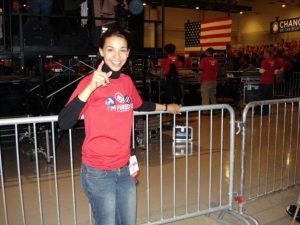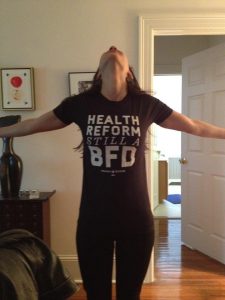Like many a revolutionary, Liz Jaff’s face often carries the hint of a mischievous smile. But when she heard that Congressman Chaka Fattah had been indicted, she was beaming. Jaff, the 30-year-old political director of Crowdpac, the upstart digital operation that crowdfunds potential political candidates —thereby serving as a recruiting tool to entice them to run—saw this as an opportunity.

Within days of Fattah’s indictment, citizens were logging on to Crowdpac and nominating candidates that they’d like to see run for his still occupied Second Congressional District seat, and pledging money to them. Among those most often-named:. Ward leader Dan Muroff, (who has since announced his candidacy), State Rep. Brian Sims (who is said to be about to), real estate investment analyst and millennial politico Dan Kessler, recent mayoral candidate Doug Oliver, and even Mayor Michael Nutter. Within five weeks, Crowdpac had 18,000 views, nearly half of whom were from those under 35; to date they have taken over 250 nominations and $92,000 in pledges for these candidates, thereby influencing their run-or-not deliberations. Only the candidates can see the amount pledged to them, and they can only access said amount once they announce they are running.
How radical is this? Think of the way it is usually done when a choice seat opens up. Generally, interested candidates would kiss the ring of party boss Bob Brady, who would decide who is next in line. To take just one recent example: In 2014, when then-Councilman Bill Green resigned to chair the School Reform Commission, Brady’s ward leaders met behind closed doors and anointed underwhelming State Representative Ed Neilson, former political director of John Dougherty’s union, to run in the special election against a Republican who had no chance, owing to our 7 to 1 registration imbalance. Essentially turning over a City Council seat to Neilson solved a vexing political problem, because he was heading for a primary fight against fellow Democrat John Sabatini, Jr. in the State House—but that had nothing to do with what was best for the constituents of Philadelphia’s City Council. The people had been shut out.
“Technology has democratized everything else,” Jaff says. “Airbnb democratized the rental market. Uber democratized transportation. Kickstarter democratized entrepreneurship. Why not politics?”
“That’s not Democracy,” says Jaff,a veteran of both Obama presidential campaigns. “We’re providing tools so anybody can be nominated and, because of crowdfunding, more people can test the waters without fear of repercussions. It used to be, if you wanted to run, you’d go to the party and they’d tell you that so-and-so helped three people get ward positions, so you’d have to wait your turn. Now you can nominate yourself or have someone nominate you on Crowdpac and see if people will support you.”
The brainchild of Brit Steve Hilton, a former aide to Prime Minister David Cameron, Crowdpac has the backing of some Silicon Valley venture capitalists. It bills itself as the “match.com of politics” and as a go-to source for the most “objective data on political candidates.” It boasts a proprietary algorithm that ranks candidates on the liberal to conservative spectrum, and that links political donations to policy outcomes, so (theoretically) you can actually see what laws certain contributions have bought. That’s interesting, though the liberal/conservative rankings can be misleading: Locally, after all, there are many pro-labor Democrats with concerns about the influence and actions of local labor groups. Are they liberal? Conservative? But it’s the crowdfunding component that is the site’s most game-changing feature.
Running for political office has long been a daunting, lonely pursuit; Crowdpac allows a potential candidate to get a sense of his or her level of support before wading in. With citizens lined up with you, taking on the ward leaders and apparatchiks suddenly doesn’t seem like the career suicide it once did.

“Technology has democratized everything else,” Jaff says. “Airbnb democratized the rental market. Uber democratized transportation. Kickstarter democratized entrepreneurship. Why not politics?”
Crowdpac debuted in Philly earlier this year, and will soon expand to nine other cities. There still is no real business model, though the startup’s Silicon Valley backers seem confident one will emerge. The plan is to take a percentage of all donations made through the site, but Jaff laughs when quizzed about its viability. “There’s $16 billion spent every election cycle,” she says. “If we become the place everyone goes, there will be a revenue model.”
As political director, Jaff is Crowdpac’s person on the ground, a fast-talking true believer who, when on the Obama team, wouldn’t date anyone who didn’t genuflect before the Obama altar.
Jaff grew up in South Africa, where thinking different was in her DNA. Her great aunt was Helen Suzman, an ally of Nelson Mandela and one of the leading anti-apartheid voices in South Africa. After decades in Parliament, she was twice nominated for the Nobel Peace Prize. Liz was four when Mandela was released from Robben Island; she remembers bouncing on his knee at his inauguration. “He wore crazy shirts,” she recalls.
In 2006, at the University of Capetown, she attended a talk by a young United States Senator with a funny name and big ears. He was promoting his book, Dreams of My Father. It was an intimate setting, and Liz must have felt what her aunt had when Mandela’s words had first washed over her. “The way he spoke and listened to us,” she says. “I fell in love. We all did. For young people like us, we’d grown up watching West Wing. Here was my President Bartlett.”
“That ‘wait your turn thing’ is so British,” Jaff says. “Barack Obama didn’t wait his turn. Don’t listen to the consultants and the party elders. No matter what they say, we need more people to run.”
When Obama announced he was running for president, even though her aunt was tight with Hillary Clinton, Jaff bought a one-way ticket to Iowa. She showed up in Des Moines and told the youthful Obama crew she was there to work. Soon, she and a handful of others were at the candidate’s side as he stood on a milk crate to talk to 12 veterans in an old warehouse in Sioux City. Next came Nevada, Colorado, and Wyoming, before being assigned to run the field campaign here in Montgomery County. Rumor has it she even got an Obama tattoo; “I can neither confirm nor deny,” she says, sheepish.
Jaff worked in the White House and the Commerce Department, and then for the 2012 campaign. But by then, some dissatisfaction had settled in. “It wasn’t young love anymore,” she recalls. “It’s like any relationship. By then, you’ve seen your partner eat with their mouth open. Your eyes are wide open.”
Jaff’s experience mirrored that of many in the Obama generation. They’d been so high on the prospect of change—remember the young people chanting “Race doesn’t matter!” on election night?—that they weren’t ready for the unappetizing specter of political sausage-making. By the time she’d gone to work on Capitol Hill for a congressman, Jaff came to some hard truths about her hero. He was great at inspiring rhetoric, but politics, she learned, was also about getting stuff done. “He didn’t care about catering to the press pundits or playing the political game,” she says. “He’s a professor. He cares about policy. I learned to believe in relationships before policy.”
On the Hill, Jaff worked on bipartisan legislation, only to find that the political establishment—taking its cue from primary voters—didn’t care about passing solutions. “They wanted you to just bang the message drum,” she says.
She had an offer to be a Chief of Staff. Did she want a career on the Hill? Is that what she came to America for, or was it something more romantic and idealistic? She’d been thinking that the real action—from education to health care to infrastructure—existed locally. Maybe a difference could be made there…if we could somehow have true Democracy in the form of competitive elections.
Then Hilton called, with this idea of disrupting what had been passing for Democracy. That’s when Liz Jaff had her WTF moment. “You’re more of a challenge seeker than a resume builder,” a mentor told her, and so she jumped in, going for it in a way that was eerily reminiscent of a certain groundbreaking woman from South Africa’s history books. Helen Suzman spent 13 years as the lone voice of opposition to Apartheid in Parliament, calling odious South African president P.W. Botha “an obnoxious bully” and citing among her great accomplishments being declared an “enemy of the state” by Zimbabwe’s corrupt dictator Robert Mugabe.
Once Jaff made the switch to Crowdpac, a lot of friends in the Democratic establishment threw up red flags. More people running? More primaries? How does that help the party? Friends from the Obama campaigns questioned her loyalty. “Sounds like you want a monarchy,” she told them. “That ‘wait your turn thing’ is so British. Barack Obama didn’t wait his turn. Don’t listen to the consultants and the party elders. No matter what they say, we need more people to run.”
Liz Jaff describes Crowdpac as subversive, and her awakening actually hearkens back yet again to her great aunt. Helen Suzman stood by Mandela’s side when he signed the country’s new constitution in 1996 as its first black president, and she remained a principled political leader. She was critical of her friend when he praised Libya’s Muammar Qaddafi as a supporter of human rights and, when Mandela’s ruling African National Congress crossed the line, she blasted those in it who would “put party and state above the individual, whether black or white.”
Sound familiar? Suzman died six years ago, but now her great niece is in Philly, speaking truth and toppling power, and placing the individual, black or white, above party and state.
Header photo: Theresa Thompson, via Flickr

